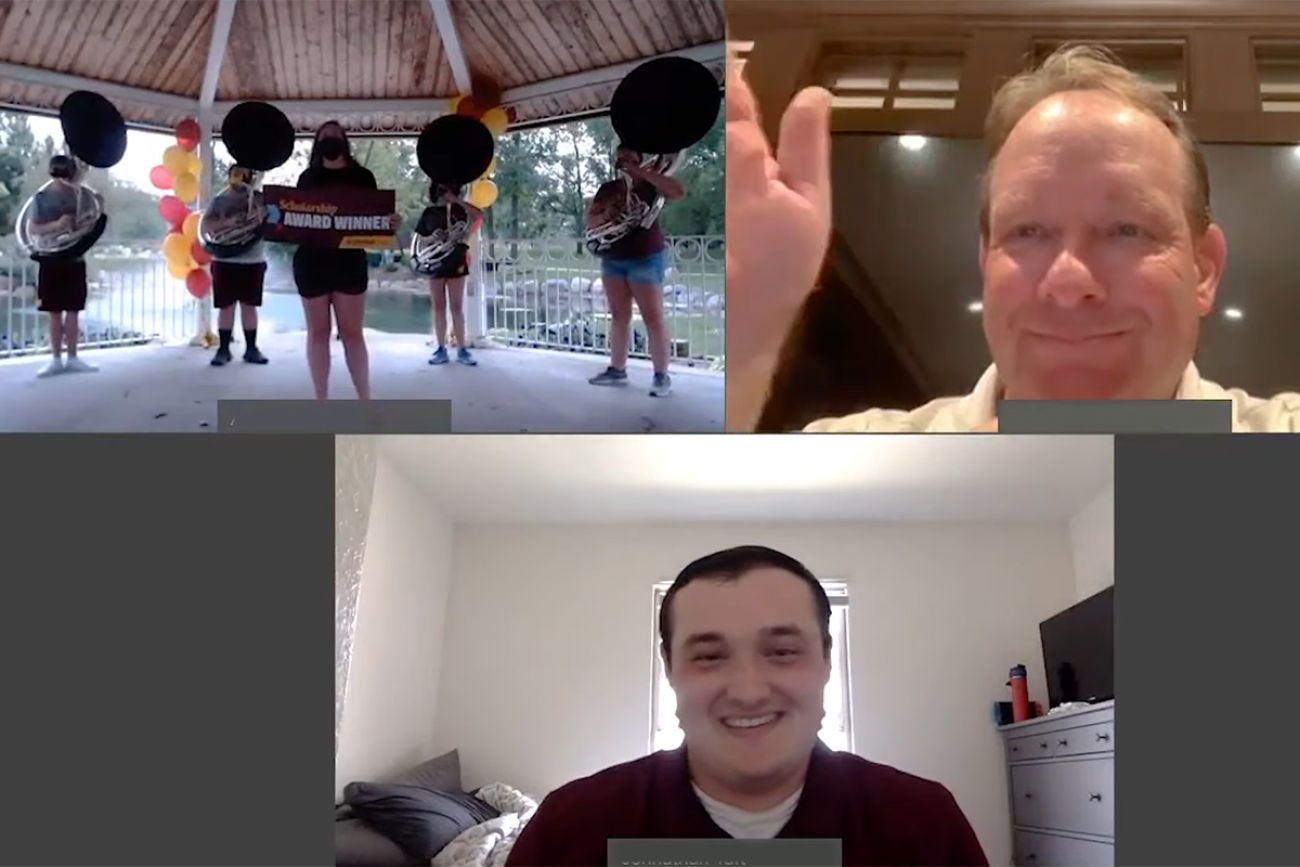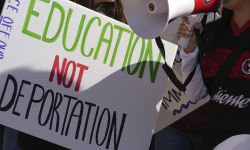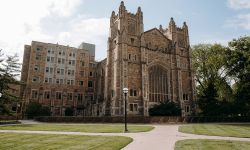Michigan colleges hope raffles boost COVID-19 vaccinations in time for fall

Oct. 12: Michigan college COVID outbreaks plummet as students vaccinate and mask up
Johnathan Taft doesn’t consider himself lucky when it comes to contests, but getting a COVID-19 vaccination paid off for him this month when the Central Michigan University senior from Greenville won a scholarship valued at a full year of tuition.
CMU turned to an incentive raffle to boost the number of students vaccinated against COVID-19 before fall classes start on Monday.
Despite his prize, this program wasn’t the reason behind Taft’s vaccination. Instead, he received his second dose on April 8, three months before the incentive program began.
Related:
- Almost half of Michigan students now in schools with COVID mask mandates
- Michigan college enrollment dropped amid COVID, group urges state to step in
- Michigan colleges set fall requirements for masks and COVID-19 vaccines
- Q and A: How the pandemic stunted Michigan low-income college enrollment
Many of the other students he knows also were fully vaccinated before CMU’s announcement. But, he said, he recognizes that it could influence some who weren’t sure about the vaccine.

“I think it’s a decent start to trying to get people who are hesitant to get vaccinated,” Taft said.
However, he added, “if I didn’t want to get vaccinated I wouldn’t have gotten vaccinated (for the raffle).”
While some schools, like the University of Michigan and Michigan State University, mandated that students have to be vaccinated, others turned to offer a chance to win money and prizes to get more students to vaccinate before the start of the fall semester.
Schools like CMU, Oakland University, Eastern Michigan University, Albion College, Grand Rapids Community College and Western Michigan University offered everything from $10 gift cards to full tuition.
Unclear, so far, is whether it worked.
The success of incentive programs is still being evaluated, officials told Bridge Michigan, with numbers still unavailable for how many students may have been inspired to get the vaccines.
Incentives are “necessary, but alone insufficient,” Daniel Hurley, CEO of the Michigan Association of State Universities, told Bridge.
“These incentive programs are still not going to be the end-all, be-all tool to maximize student uptick of the COVID vaccine,” Hurley said. “They’re one strategy employed by many, if not most, of the universities in the state to encourage students to get vaccinated.”
Central Michigan University announced its vaccine incentive program July 19, when it made vaccines optional for fall. Drawings started this month and continue into fall. Prizes beside full tuition include 400 $75 Visa gift cards, and all students who register will receive a 20-percent off coupon to use at CMU’s bookstore on apparel and imprinted gifts.
At the time it started the incentive program, the university set a goal to get around 70 percent of students registered and vaccinated. A survey sent mid-summer to students, faculty and staff found that 34 percent of on-campus students, 60 percent of staff and 71 percent of faculty were vaccinated.
But as the delta variant spread and cases increased in Michigan and across the U.S., CMU changed its policy: This upcoming fall semester, the university will require students to either be fully vaccinated against COVID-19, or to submit to weekly testing.
Most of the 6,722 students registered for the incentive program have been main campus students, says Jennifer DeHaemers, vice president of student recruitment and retention at CMU, representing about 45 percent of those enrolled for fall semester on all CMU campuses as of mid-August.
The program comes amid low vaccination rates in Isabella County, home to CMU, where 36.2% of its total population was fully vaccinated against COVID-19 as of Aug. 19. The statewide average is 65.2 percent.
Across the U.S., about 46 percent of individuals between ages 18 to 24 were fully vaccinated as of Aug. 20, according to the Centers for Disease Control and Prevention. In Michigan, 38.8 percent of 16 to 19 year olds have completed their vaccines, while 37.7 percent of 20 to 29 year olds are fully vaccinated against COVID-19, as of Aug. 20.
The university will offer vaccination clinics on campus this fall, and it hopes more students will be inspired by the prize drawings to get the shots. These clinics will also help CMU understand how its program is working for on-campus students.
“It’s hard to know exactly if this incentive program is causing people to get vaccines. I think we will know more when school opens back up … and we have vaccine clinics available again,” DeHaemers said.
The program had another drawing on Monday, and two more are planned for Sept. 13 and Oct. 4.
“I think we will see more (students register) after classes start and students get here and have the shots easily available to them,” DeHaemers said.
At Wayne State University in Detroit, administrators announced the school’s second vaccination incentive program on July 22. It allows individuals with at least one dose to sign up until Sunday.
During the first program in April, students that received at least their first dose of the vaccination received a $10 credit on their university payment card, OneCard.
“There was nobody on campus (because) we were virtual learning at that point,” David Strauss, dean of students at Wayne State University, said.
“To get (around) 2,700 students to sign up for the incentive program - we think that is a great success.”
Its second program, Summer Warrior vaccine incentive, is open to both students and employees. As of mid-August, 6,827 students, 868 faculty and 2,265 staff members had enrolled in the vaccination raffle.
Enrollment for WSU was 26,251 students for the fall 2020 semester.
The stakes in the second round got higher: Prizes for students range from $100 vouchers to a free semester of tuition. Faculty and staff can win prizes ranging from $25 Grubhub gift cards to one year of paid parking.
The university will be mandating vaccines in the fall, and is not sure if it will have an incentive program during fall. In a report from July 23, WSU found 84.3 percent of students and 91.5 percent of employees received their full dose of the COVID-19 vaccination.
“We want to get back to what it was like before COVID and we want to keep everybody safe,” Strauss said. “When we went to virtual learning, as so many universities did, I think it took away from the opportunity for a vibrant campus community and that’s what we thrive on...so whatever we can do to get back to that, that’s our goal.”
The state on Monday completed its own vaccination incentive program, MI Shot to Win. While that program didn’t show a major increase in vaccination rates in Michigan, data shows it did stop the steep decline in the number of weekly shots the state was facing as it was launched July 1.
On the college level, Taft, CMU’s first scholarship winner, says the incentive program may have been a good tool to inform students about vaccinations, and decide if the choice is right for them.
Over the summer, Taft works two jobs to afford his time at CMU. During the school year, he works a job in addition to his classes and program requirements for his athletic training major.
No matter how CMU’s incentive program inspires vaccination rates on campus, it made a lasting impact on his senior year.
“It was a big relief for me because I stress out a lot about how I am going to pay tuition for school,” Taft said. “It costs a lot of money, and I pay for it myself.”
“Winning the incentive took a big weight off my shoulders.”
Michigan Education Watch
Michigan Education Watch is made possible by generous financial support from:
Subscribe to Michigan Education Watch
See what new members are saying about why they donated to Bridge Michigan:
- “In order for this information to be accurate and unbiased it must be underwritten by its readers, not by special interests.” - Larry S.
- “Not many other media sources report on the topics Bridge does.” - Susan B.
- “Your journalism is outstanding and rare these days.” - Mark S.
If you want to ensure the future of nonpartisan, nonprofit Michigan journalism, please become a member today. You, too, will be asked why you donated and maybe we'll feature your quote next time!






